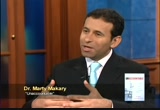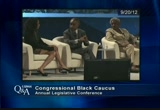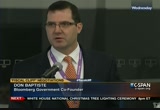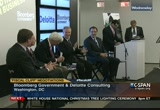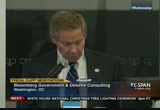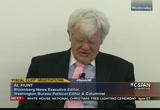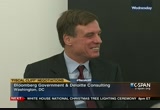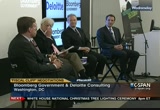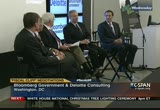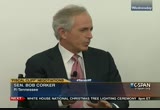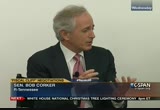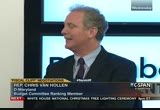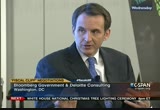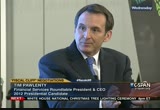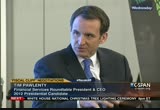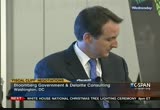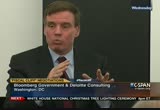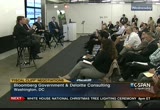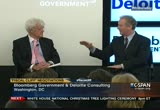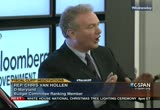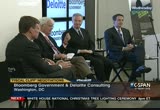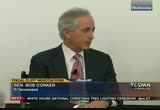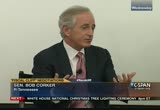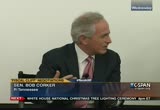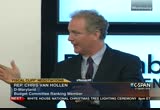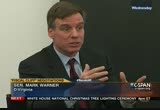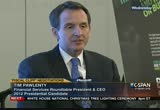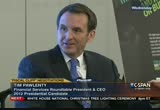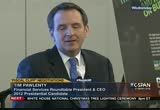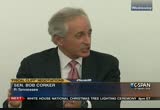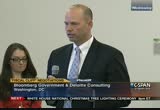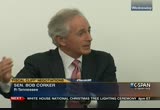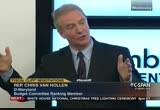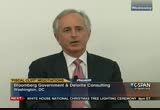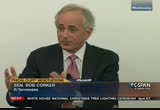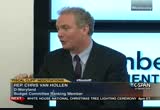tv Avoiding the Fiscal Cliff CSPAN December 8, 2012 7:00pm-8:00pm EST
7:00 pm
we are treating. and you have to step back and ask, you know -- are we hurting people overall? on a global level, what are we doing sometimes? 30% of everything we do not be necessary in health care. 30% of all the medications we prescribe, the test speed up border, the procedures. >> dysfunction in the u.s. health care industry. the doctor on what hospitals will not tell you. his latest is unaccountable. tonight at 10:00 on afterward, on c-span2's book tv. >> supreme court will look coble was passed in 2008 by a majority of 623 and they will say that as president. and indiana had a -- >> they decided on the indiana
7:01 pm
case it was constitutional for them to establish id. they did not say the state to a subsequent -- >> let me finish. you misrepresented what i said. the supreme court as the law of the lan. >> when i hear these accusations that black people, voter id l affectproportionately minorities, -- to me if white americans can get id's to vote and to the processes to follow the laws, what are you telling black people? that somehow they are not good enough? they are lesser then? that is what bothers me about the rhetoric coming from democrats and the left. that we always have to make special -- to ask to be a
7:02 pm
specialist -- specialness but we deal with minorities because they are two people minded. we have to make concessions for them because they cannot follow the rules like everybody else. when you treat people like victims, i do not think they want to inspire. >> more with the editor and publisher of conservative black chick.com, sunday night at 8:00 on q&a. next, house budget committee ranking democrat chris van hollen, a tennessee republican bob corker and other members of congress talking about this fiscal cliff. hosted by bloomberg government and the lloyd. this is about an hour. -- and deloitte. this is about an hour. >> good morning. i'm the head of bloomberg government. thank you for joining us today, and thank you to deloitte for partnering with us in this event. when we launched bloomberg government just about two years
7:03 pm
ago, we had the aspiration of creating a one-stop shop, with data, tools, news, and analysis to help government affairs and government sales professionals make better and faster decisions. we went a long way toward achieving that aspiration. a big part of it is conversations on the important issues that face our nation today, particularly at the intersection of business and government. today's discussion on the fiscal cliff clearly meets that. we are honored to have such a thoughtful panel. senator mark warner, senator bob corker, congressman chris van hollen, governor tim pawlenty, who is currently president and ceo of the financial services roundtable. moderating our discussion today is al hunt. we always love having al over here. he really put bloomberg on the map here in d.c. yesterday it was his birthday -- happy birthday, al. [applause]
7:04 pm
i'm going to turn things over to congressman tom davis -- this is a man who really needs no introduction here in washington but has been a great friend to bgov over the years. i would be remiss if i did not give his full official title -- he is the director of federal government affairs at deloitte. please join me in welcoming congressman tom davis. [applause] >> thank you. and most importantly, i left congress undefeated and unindicted. on behalf of deloitte, i want to thank our all-star panel. senator corker, governor pawlenty, congressman van hollen, senator warner, for participating. and of course our all-star moderator, al hunt, giving up his birthday to be here. we appreciate that. this is hopefully the first of many events that deloitte will be partnering with bloomberg government. at deloitte, we are particularly invested in it solving the
7:05 pm
fiscal cliff. our ceo has met with the president and other ceo's to discuss the impending crisis. we even published their own study on the deficit, copies of which are available here today. we look forward to continuing this conversation, keeping the dialogue on going for the next month is critical if we're going to solve this problem -- and we think our panel will be very enlightening in terms of what the issues are. so, al, with that i will turn it over to you and the panel. we look forward to a productive hour. thank you very much. >> can everybody hear? i welcome you all to bgov -- if you do not know as much about it as you want, i invite you to stay, because it really is a fabulous place. we do have an all-star panel. i will start with my left, which is where bob corker says i always start. tim pawlenty, former governor of minnesota. i wrote that i thought that if he could get the nomination he would have been the strongest republican presidential candidate.
7:06 pm
i was absolutely right -- we just could not figure out how to get there from here. tim is now the head of the financial services round table, a job he took just about a month or two ago, and will be a huge player in washington in the coming months and years. chris van hollen -- first of all, he was redistricted and he kept 2/3 of his old district, but your margin did not go down at all. maybe a little -- one county he represents, where my son is, let's just say that they think that attila is a liberal. but he did an incredible job. chris, i would say, we are with two senators now, and i am always reminded of when bob dole in 1968 left the house to go to the senate, he said in that single act he enraged the intelligence of both bodies. bob corker is from the state that i think has produced more
7:07 pm
interesting and important politicians over the last 40 years than any other in america, even though it is a relatively small state. howard baker and al gore and now bob corker -- it really is an incredible testament to your state. it probably goes back to the tensions during the civil war -- east and west and all that. >> probably does. >> and mark warner, probably more than anyone, tom davis is encyclopedic on everything political, but mark warner probably more than any single figure has taken his state of virginia from a fairly reliable red states to a state that i would call almost a slight bluish purple. he left the governor's office seven years ago. he has been out of state government for seven years. he is the most popular figure in the state of virginia, and has been throughout that entire time. not only has he achieved that, as he has achieved that while he has been a member of the united states congress.
7:08 pm
that really is extraordinary. this is going to be really fun today. let me just give a quick preface. i have been in this town for 43 years. i have never seen anything like the last month. it has just been incredible. people are rallying together. it is galvanizing. it shows you what strong leadership can do. i do not think many people think you can have a strong leader who did not have roots in washington, even more given the history of this town. to have an african-american leading like this is just extraordinary. and i think rg3 deserves incredible credit for everything he has done. [laughter] and now we can talk about the fiscal cliff. let me start off just by -- we will do the house rules, except we will cut in half. 30 seconds -- then we will have time to elaborate on all this. i want to go through the panel. what do think the odds are that some kind of the deal will be cut by january 1 in order to avoid sequestration and all the tax hikes? mark, i will start with you. >> i think it is 80% that we
7:09 pm
will avoid sequestration. the question is, though, is this going to be a big enough deal, and will actually be enough of a down payment that it will lead to something else subsequently that will actually avoid the kind of enormous consequences of $16 trillion of debt? that percentage will be lower than the 80%. >> let's come back to the big picture -- in the short term, by january 1 -- will we avoid the cliff? >> i think it is likely that we avoid it. it does not appear that that is going so well. it is so easy for us just to do the things we need to do. i think the real line in the sand is going to be the debt ceiling. i really do think -- i have said that for a long time. i think that is when, hopefully, by that time anyway we will have real entitlement reform, which will bring all of this together.
7:10 pm
>> chris? >> i think it is better than 50% that we are able to get an agreement before january 1. but that is premised on a belief that our republican colleagues will recognize that the rates need to go up, as the president has said. if that does not come true, i think it is less than 50% that we have an agreement. >> tim? >> i would concur. given the consequences, i think that the odds are north of 50% that some sort of deal would be reached to avoid the fiscal cliff. i know it is hard to read the tea leaves because in the meantime you have these offers viewed by each side as not serious, kind of like fiscal cliff bungee jumping. people jump in and spring back out. but i believe the odds are good that there will be some sort of deal before the cliff. >> let's get into the longer- term deal -- everyone believes entitlement reform and tax reform is going to take place in 2013, maybe 2014. but just in the short term, can the republicans, can enough republicans say, we do not like
7:11 pm
it, but we are going to go along for now with the 39.6% rate and come back with a promise of next year of trying to lower and broaden the base? >> i would much prefer that we do the kind of pro-growth reform that i laid out in a bill a few weeks ago, not thinking that this bill is going to become law, but a way to show a path forward with $4.5 trillion in savings. i think that in the event that the house feels that, when they see that the senate is obviously controlled by the democratic party, you have a democratic president, you basically have the president, let's face it, not being too pejorative, that has been a one trick pony. it has been the rate is all we have been talking about, really nothing else. in the event -- i think this is what tom cole was saying this morning, in the event the house sees there is no way out, that
7:12 pm
ultimately you hold less of the country hostage if you do not do something -- if they do that, what does happen all of a sudden, the president has to actually do something that is a real on the entitlement side. i would say to you, i would hope that what we would do is in the interim end up with something that works for the country from the standpoint of revenues, works for republicans from the standpoint of revenues, and in that package also has the entitlement reforms that need to happen. i think we have all seen the discretionary caps are mostly bogus. we violate them nonstop. the only thing that republicans, i think even people like chris, who has been reasonable on all this, believe is real is entitlement reform. so i would hope that we would and up -- by the way, it is easier to implement the policies
7:13 pm
that need to be implemented to solve our problem then it is to create a process to negotiate and create another fiscal cliff down the road. i hope we will not do that. i still think there is time before the end of the year to make that happen, but again, if it does not happen, unfortunately what that does is throw us into another debt ceiling situation, which is just not good for our country. we would be so much better off starting off on january 1 with this in the rearview mirror. our economy would take off and our country would be so much better off. >> chris, you understand the politics of the house from both sides. can john boehner cut a deal without eric cantor and paul ryan? >> i have a pretty good understanding of the house, but i always am a little afraid of wandering into house republican leadership politics.
7:14 pm
just to broaden the question a little bit -- i think the question is whether or not the speaker is going to be able to bring a good part of his caucus with him. that or require a united leadership team. >> i am talking short-term -- the next two or three weeks. >> i think that is going to be a requirement. i think one of the decisions the speaker will have to make is whether he is prepared to put a agreement on the floor of the house that might not have a majority of the republicans in the house in support. that is one of the questions. senator corker points out that there are a number of ways you can get to a yes on this, but it is not clear if there is a way to get to yes that necessarily brings a majority of house republicans.
7:15 pm
not that we cannot get a majority vote in the house, that they apply the so called hastert rule, that you have to have half of the republicans no matter what before you even bring a bill to the house -- that could clearly complicate matters. people should understand there is no requirement that that be done. we can get a majority vote in the house without necessarily having half of the republican caucus. >> even though i hate to mention birthdays, it was when you were a little kid, the o'neill rule, to. it was not just a republican -- >> there have been moments where speakers have allowed those to pass without a majority. >> let me ask you, tim, as a republican and as the financial services chief now -- if you were to go a long or the country were to go along with restoring that top rate, the 39.6% rate, what kind of commitment would you like to get in order to do that? you cannot do anything in the three weeks -- you cannot reform entitlements and taxes in three weeks. >> if i might, stepping back
7:16 pm
from that question, i really applaud senator corker's perspective of saying, if we can get something done totally by the end of the year that would be great, rather than this to work restate process. i would hope for that. it is a wonderful goal -- behind that, all of these ideas have been white papered, seminared, data runned for 20 years. the options are not a mystery. the options of what might be done have all been put on the shelf and debated for a long time. the question is, do we collectively, does the congress specifically have the will and inclination to do any of them? when i was a governor, we had the first government shut down in minnesota in 150 years. we had a dynamic similar to this. it was not precisely the fiscal cliff, but we had a very dramatic moment with divided government executive and legislature, and i learned some
7:17 pm
things in that moment. one, you cannot corner people so totally and so badly that they have no way out. because if you do that and you do not allow them some face- saving way out of the corner, they will have no choice but to do something dramatic. and it is a very delicate situation, and there is a margin where people can miscommunicate, particularly when you have lots of people communicating. so there's a margin of error you have to factor into these discussions as well. in that moment, back in 2003, i had a lot of leverage. i was a newly elected governor, i had a lot of political leverage and for various reasons i will not bore you with had the upper hand in the negotiations. i put the pedal to the metal. i won that round. however, the ill will that came from pushing to the other side was so strong that years later legislative leaders remembered how difficult that negotiation was and how unreasonable in their mind i was.
7:18 pm
we were still talking about payback six and seven years later in future negotiations. i share that -- as you think about not just this moment but the relationship between the congress and the president going forward. it is unclear whether there is enough republicans to support or even consider the rate increase generally, but at the very least i think they would want to see not just that question, but they would want to see what does it come with. i describe it as the two wings of the plane. people are working on one side, but not much discussion on the entitlement and structural spending reduction wing. republicans have put revenues on the table. there are lots of different ways to get revenue, including economic growth. there are other ways -- means testing on the table. if the goal is to get wealthy people to pay more. but it is unclear that the rate issue has been embraced or will be embraced by enough republicans, but it is certainly not likely to happen unless they have crystallization on the entitlement spending side of the plane, and it is not happening at the moment.
7:19 pm
>> mark warner, let me go to you. i do not believe anyone has spent more time on this issue than you have over the last year or so. i do not know if you have all seen yet, but there is a marvelous study by our great economist that says 8 $4 trillion in the plan, which is what people are generally talking about, that includes about $800 billion in savings from the afghan war, includes $1.1 trillion or so of cuts that were agreed to last year. but that does not stabilize the debt to gdp ratio. it takes a $6 trillion package to do that. are we thinking too small? as you approach next year and some kind of a package? >> one of the problems, and bob and chris have been equally as involved in this as you get deeper and deeper and slowly sink in to a baseline hell, which can get you in a circular circumstance, and a lot of the numbers around $4 trillion were off that 2010 base.
7:20 pm
that we keep coming back to in certain ways. so yes, the number of what it takes kids growing up, but when you count -- and bob and i could have some disagreements that we have not completely honored the discretionary cuts, but pretty much everybody agrees that you have got between $900 billion and $1.1 trillion in cuts already made. i get a little worried about the so-called accounts and how much you want to count those, whether that is washington funny money talk. but when you add interest and other things, the notion that a $4 trillion-plus deal over a 10-year frame with whatever your revenues spending cut ratio is so much smaller than what is being asked of people in every other industrial country in the world as a percent of government spending, a percentage of gdp, that it is almost to my mind un-american that we would not
7:21 pm
be willing to rise to this challenge, and echoing what bob has said, i fundamentally believe a real deal would do more for economic growth and more to get capital off the sidelines, not just in terms of american companies but international companies that are looking where to invest with the challenges in europe, with china going through a transition, with india's political system, as chair of the india caucus, almost more dysfunctional than ours. we look pretty darn good if we can put a real plan in place. >> what would be the size of the plan? >> i think it gets north of $4 trillion, whether it gets to $6 trillion.
7:22 pm
this goes back to where you start. two points -- kind of on the opening round questions. it is important to remember that the simpson-bowles plan, which has gained a lot of attention, or the gang of six, which is built off the simpson-bowles, the presumptions that went into those plans assumed that all the top rates would go back up. when you start from that, even though i think simpson-bowles's idea that he would bring the rates down to the high 20's is a bit of a stretch. i do not think we will see that kind of across the board almost zeroing out in some places of tax expenditures that would require. they can show a path towards meaningful tax reform even with the rates at the higher level. point two, and this is one of the things where i think those of us on the democratic side need to help bring some clarity -- we throw around the notion that increasing the rates to the "bush levels" would, depending on your baseline, did you close to $1 trillion in additional revenue and net over
7:23 pm
10. the issue is perhaps we need to better socialize those increasing rates, the rates themselves on the income tax side only get you a little more than half a amount. the other pieces, capital gains going back up, dividend's going to ordinary rates, the estate tax not even going back to the compromise. i do worry a little bit that we need to have some clarity on this -- we use as code, we are bringing rates back up, we ought to make sure it is a $544 billion revenue increase or a $1 trillion revenue increased because what is in that buckets -- i think we need to have that more socialized.
7:24 pm
>> i am going to come back to tax reform in a minute. the other part of this is going to be entitlement reform. the president has proposed some entitlement changes but almost all on the provider side. they are not as big as a lot people say will be necessary. if the republicans give on taxes, will the democrats be willing to give on issues like raising the eligibility age, means testing on taxes? medicare for more affluent recipients, excluding my wife? >> let me just say that we would support a balanced approach, and it is important to point out, as senator warner did, that we have done over $1 trillion in cuts in the next 10 years which the president is committed to keeping.
7:25 pm
with respect to medicare, we do have a very different approach to dealing with medicare. there is no doubt we have to bring down medicare health-care cost growth. the difference is that we believe we should expand on the kind of reforms that we made in the affordable care act, where we achieved billion about $716 billion in savings, not simply by across the board provider cuts, but by changing the incentive structure, the way we pay providers so we focus on the value of care, not the volume of care. i think it is ironic that we have gone in the last four weeks from many of our republican colleagues criticizing the president for having done too much in savings on medicare, $716 billion -- their presidential candidate proposed putting that money back in, in other words adding $716 billion back into the cost of medicare, to complaining the president does not want to do enough. >> who was that presidential candidate? anyone remember? >> i do not want to relitigate the campaign, but it is an important point, i think, which is he proposed that we put the $716 billion net cost back into medicare, which would have shorten the life of the trust fund by eight years.
7:26 pm
now, the president's budget, and i invite people to look at it, in the next 10-year window, if you compare it to the ryan republican budget, on medicare, more medicare savings in the 10- year window then the ryan republican budget had. it gets it in a different way. he does ask pharmaceutical companies to go back to paying the rebates they were back in 2003. he also has some reforms in medigap and other areas and a number of other things the president does there. so yes, we need to look at the long term issues. we started that in the affordable care act. we can build on those things with respect to dual-eligibles and how will we better coordinate that care. that is a very different approach than transferring
7:27 pm
rising health-care costs on to seniors, which by the way, does not reduce overall health-care costs, just transfers them. all the data shows, if you look at the per-capita increase in health-care costs in the medicare system, compared to the private health system, actually medicare compares very favorably. medicaid has a much lower per- capita increase. so simply moving somebody out of the medicare system into the private health care system -- it transfers some of those costs, but if you look at overall health care, where we spend 18% of gdp on health, way more than the other oecd countries, we should be finding better ways to figure out the care. >> i want to bring up tax reform, i won all of you to jump in at any time, but let me put tax reform on the table, bob. there is a sense in the town, we can do it all through tax reform. anybody who lived through the reagan tax reform, which is
7:28 pm
often cited, let me just give you a couple differences between then and now. then they were looking for something revenue neutral. now we talk about tax reform as raising net revenue. back then, they indeed did lower the rates. how did they lower the rates? a huge corporate tax increase. that is off the table now. how else did they lower the rates? they increased the capital gains rate to ordinary income, which many republicans and more than a few democrats say is unacceptable. and finally, they had probably without question the most politically brilliant treasury secretary and deputy we have ever seen in this country, jim baker, and people on capitol hill on the other side like bradley who were dying to work together. we do not have any of that today. we talk about tax reform as if it is a magic panacea. >> well, you saw the story today in the "new york times," and the tax policy institute, which is certainly not a right of center institution, i think it would be slightly left of center, at least center -- if you cap deductions at $50,000 it generates $750 billion over 10 years. if you do the chain cpi, which i
7:29 pm
think mark has embraced. >> do you include charitables in that camp? >> you can include charitables, or you can also look at the health-care exclusion, which by the way is the most massive that exists. i do not know why people in the income categories that mark and i are in and now tim with his big budget job -- i do not know. >> bob, i hate to tell you, he is in a higher category than you. [laughter] >> they will publish that soon, i am sure. i do not know why we should continue to have the benefit of our health care plans coming to us in a tax-free way. there are all kinds of ways of looking at it. i do realize that to do real tax reform takes time, but i think we could go ahead and do some things. for instance, the $50,000 exclusion -- i realize that has been a non starter so far. i actually think we will end up with some machinations that
7:30 pm
address some of the things that mark said a minute ago. candidly, if the president got -- all he has talked about, and i think it has been damaging to the debate. i personally believe that because we have -- we have constituents who come up and see us and say, stand with the president, please, do this 2% -- this rate increase on the 2%, but if he got it, as mark mentioned, it is under $0.5 trillion. if you do not socialize all the other things, you have not done anything. i think again what tom cole was saying the other day -- maybe we should give it to him, because then all of a sudden there is a debate that takes place about the real things. i want to come back and say, you can easily get to $1 trillion in revenue with a four-page bill dealing with the tax peace, and again it is not something that a lot of northeastern states like, i realize, because of high state and local taxes, but you can get there.
7:31 pm
what i hope will happen is instead of spiking the ball the president will sit down with boehner, who i think really wants to do something -- i think both sides agree that they want to do something. i hope they will sit down and mesh something together that republicans can be ok with that generates the kind of revenues that we need, but also the kind of entitlement reforms. you keep saying -- i love you and you know that, and i love the things you state about the other senators from tennessee -- the fact is that the decisions, all the options around the entitlement reform have been discussed. we all know what they are. it is very simple to put them in legislative language, and to try to put this off just continues the misery that the american people are living through. i just do not see the need to not address their revenue peace now, but also not to go ahead and address the entitlement side.
7:32 pm
if we need to do more tax reforms down the road after we do what we are doing right now, you can go back and do exactly what you just said. do the remainder of the tax reforms in a neutral way. but you are creating a much flatter code, a broader code that does not have all the loopholes that exist. >> i can see you are dying to jump in. >> on the tax math, very little attention was paid to the president's original proposal which, in addition to raising the rates on higher income earners has a tax reform proposal. having looked at lots of different tax reform proposals, the so-called super committee, the president's proposal is pretty clean. he says, for high income earners, we are going to reduce the value of deductions to 28%. he actually includes some things beyond the big three -- the mortgage interest and charitable, and state and local, to include high income earners, some of the things senator corker is saying.
7:33 pm
>> there are some similarities. >> but it is very clean. you could do this very quickly. and it does not have the negative impact of some of the ideas were you cap deductions, which depending on your state could totally eliminate charitable deduction. you would be taxed fully on all the money you give to charity with those proposals. the president has a clean way. out of the $1.6 trillion, it is $600 billion from tax reform and he gets $1 trillion from raising upper income rates. to put in perspective, we go over the cliff, it is $5 trillion in revenue over the next 10 years compared to $1.6. senator warner has pointed out, look at the bipartisan simpson- bowles, they propose more revenue than the $1.6 trillion the president has proposed. that is embedded in their plan. the president's proposal has less revenue than is embedded in simpson-bowles.
7:34 pm
and he has the tax reform element as well. i hope people will really take a look at what the president has put on the table and not just because he did it say that that is not the right approach. >> mark, and then tim. >> a couple things here. to try to keep this in perspective. i do think it is important -- how did we get here? let's briefly refresh. both sides share the blame on this. let's not lay out one side or the other. in the last 12 years as a country, we took, depending on where you start, $4.5 trillion out of our revenue line at the same time that we double defense, created a whole new category of spending called homeland security, went to war twice totally on a credit card, created a brand new entitlement medicare part d, and we have the aging of a population that means the entitlement programs that have been wonderfully successful, those of us were willing to say we need to
7:35 pm
entitlement reform, not because medicare and social security have not been successful, they have been, and consequently, all we are living a lot longer, which is good, but it does mean the math -- when i was a kid, 16 people were working paying for everyone retiree, now is 3 to 1, and in a decade will be 2 to 1, means we have to make adjustments. the math deniers around that i have a hard time grappling with. the simpson-bowles gang had $2.40 trillion in revenue. if we think we need to go bigger, which i do believe -- $1.6 trillion is still only 1/3 of what we had in the revenue line in the 90's. in my memory, the american economy did pretty darn well. i do think there are ways to get there.
7:36 pm
on entitlements, i find we have to challenges around health care. one, if you go back to mr. ryan's plan and the others, most of the dramatic changes he had to not even occur until -- if there is any crowd to do this in front of, you are the ones. most of the entitlement reforms in front of most proposals do not take place -- that is where my real problem is. yet we have this mechanism, a referee that does not give us any credit for things that happened. the ryan plan does not touch medicare -- how do we bridge that? many of my republican colleagues have said, if you do real structural reform, even if it takes a while, you have to get some credit in.
7:37 pm
one last point on this -- there are a lot more similarities if we could get past some of the language. public option, premium support -- all these questions about who bears the risk. beneficiaries or providers, or some mix? we talked about building on the affordable care act notions of let's try to have the ability to make consumers better utilizers of health care. if some ideas work for the uninsured population, finding ways for them to work for the medicare population should be a common goal.
7:38 pm
i think there's a lot more commonality, particularly around bring down health-care costs, then we acknowledge because we have gotten caught in these terms that have ideological baggage on both sides. look at how you bring down health-care costs in a way that does not restrict the quality of care you get. we could find some common ground. >> just address what you think -- what does the business community, especially the financial community, have a stake? >> the business community is concerned about the impact of the deal not getting done and what that will have on the economy. as the congressional budget office said, if you do not get this deal done, unemployment is going back over 9% in 2013 and we go back into recession. if you are hoping for economic growth and capital formation deployment, that is a huge problem.
7:39 pm
there are a lot of views about the details of this, but going back to the president and congressional leaders -- ask each other in private, what can you live with and what are your redlines? the president has said publicly a red line for him is tax fairness and raising rates on the wealthy. if the analog to that is a red line for republicans that they cannot raise rates, you have an irreconcilable problem in the near term. then the question becomes, if the goal is to get more money from wealthy people, there are lots of ways to do that. you heard some consensus around capping deductions. there are ways to do that in terms of limiting or capping of certain deductions and credits and exclusions. there is means testing in entitlement programs. for republicans, on the entitlement side, we will monkey with reimbursements to providers and move toward guy you added payments.
7:40 pm
all of which is good positively -- they do not fear they are going to bump up retirement ages or eligibility ages and have what they perceive to be real structural reforms and entitlements, even in the second 10. then he will have people saying, we are not going to do the tax deal or the revenue deal unless we see what they perceive to be real entitlement reforms. the parties have to ultimately say no, one can you live with, what is your red line, and is there overlap to put a deal together? what we are seeing now is each side -- there are a ton of ways to do tax reform. when i was governor i propose to cut the corporate tax rate in half and clear out a bunch of exemptions and inclusions. i thought i would get beat up from the left -- it was all my ceo's saying, what are you doing? the details matter.
7:41 pm
we have to get away from the point -- you cannot push people to a place where they cannot go. leaders and negotiators have to understand that and communicate and figure out where their common space is. i will end where started earlier today -- you cannot corner people with no way out. otherwise you will have failure. >> i will turn to the audience -- bob? >> i wanted to respond to the entitlement piece. i am a huge fan of paul ryan. i think the guy -- regardless of if you agree, he puts things out there and things about them. i think on entitlements it is very unfortunate the ryan budget did not do anything in the first 10 years. that created an unfortunate set
7:42 pm
of expectations. i agree -- $27 trillion of unfunded liabilities down the road. we can make changes right now to the medicare program that is not painful to seniors but painful to politicians. we can begin -- it begins to do the things we need to do. the best thing we can do for our country, the best thing we can do for those people struggling for jobs is to go ahead and do this now, put it in the rearview mirror. the only thing lacking is not intellect but political courage. secondly, we have to have entitlement reform that is real. this is where the money is. on the revenue case -- if you can get two people in the room, we can move beyond red lines as tim was saying and resolve this. among the mass of people on the democratic and republican side, i do not think there is that big of a difference. it just takes the political courage to sit down and make the decision to get this behind us. >> they make three points --
7:43 pm
unlike rick perry, they remember them all. [laughter] let's turn to the audience -- the first question, then we turn to the rest. >> right now we are facing a fiscal cliff. last year we were facing the debt ceiling. before that, we were looking at several potential government shutdowns. at a different level, the appropriations process has not worked as intended for years. neither has the budget process. it seems like abnormal is the normal. that type of activity in this situation where we are already looking ahead to the next potential showdown, as he suggested, with the next debt ceiling altercation, this creates uncertainty, which is not good for the private sector and certainly is not good for the federal government in terms of its ability to function in a normal way.
7:44 pm
how can congress break out of this? >> do what we are hired to do and to appropriations in a timely manner. in virginia, we have a lot of defense contractors very concerned about sequester. many of them say, warner, warner, do simpson-bowles. everyone supports it, but no one has read it. but the top line numbers are almost the same -- next time you do a default, do not make it so awful. putting a gun to your forehead -- that is what you have done. do a default you can live with. i agree with you that the most ridiculous thing taking place in the last years, particularly from some of those who say they want to not make the government in efficient, is this constant jerking back and forth of
7:45 pm
potential government shutdown. nothing is more inefficient to the largest organization in the world, the federal government, and the department of defense as a subset, and stopping and starting, the amount of hundreds of millions of dollars lost each time you grind to an almost near halt of government. stop contracting, restart it -- it is crazy. everybody i've talked to says, whatever budget you give us, give us a two-three year runway. >> going back to tim's comment -- is not good to have these red lines. it is best to figure out a way so you do not end up getting past this fiscal cliff by creating another one with the debt ceiling.
7:46 pm
the best way out -- we passed a bill yesterday on the floor, it passed 98-0. that does not make news. it came out of committee -- a defense authorization bill. you had a majority and minority that work together. all kinds of amendments that were agreed to and voted on. and it passed. that is what we have not been doing. we have had bills come out of both leader offices, airdrop on the floor, that are intended not to pass but to show differences. if we can just go through regular order, things would be just fine. >> they have regular order in the house.
7:47 pm
>> regular order in the house has not brought compromise. i would like to see things go to regular order. i am a big proponent of allowing them to work -- we do need to recognize that in the era of divided government, where you have one party in control of the white house and another in control of the house, you are going to have a lot of give and take. in that environment, commonplace is essential. if you go through the last campaign, it is not that big of an area. compromise is required. give-and-take -- people have to accept some things they do not like as part of a larger agreement. i would say getting a comprehensive agreement now that resolves many of these issues would at least reduce the constant threat of government shutdown. that is why this is so important going forward. >> i would remind everybody we have threats of government shutdown in the past -- the famous showdown with newt gingrich and clinton.
7:48 pm
when you have divided government, you have clashes of major philosophical difference. the key is being able to have an element of compromise as part of that process. that is exactly the place we are in right now, trying to find that point. >> the best model for all of you who are working so hard on this may well be speilberg's movie about lincoln. lincoln made deals. you know what, he achieved great, great goals. it goes to the point you are making -- politicians are supposed to play politics, that is not a dirty word. >> the legendary "bloomberg view" columnist -- margaret carlson. >> i had this plan for a couple
7:49 pm
weeks -- i thought, this could happen. when you said you cannot get people in the corner as the president has with the tax increase on the wealthy -- here is the plan. on december 31, the bush tax cuts expire. after you have your champagne and your funny hats on, on january 1 at 12:01 a.m., there is a middle-class tax cut and the top rate is 39.6%, then they are cut to 37%, so republicans get their tax cut. the markets do not crash and all the dreadful things do not go into effect on january 1 because you fixed it and everybody saves face and gets what they want? it could be the carlson-hunt plan.
7:50 pm
>> you also get less revenue. >> they will have to give something on entitlement reform -- they will have to make that up. >> i personally believe there is going to be a resolution to the issue you are talking about before the year is over. >> the issue margaret is raising here is the one that tom cole, the conservative republican member from oklahoma has focused on. he recognizes that if you can get into january, it will be very difficult for republicans in the house to tell the american people that everybody's taxes are going up to provide this extra tax break on the amount of income above $250,000, which is exactly why tom cole said, let's not roll
7:51 pm
the dice on that issue. the question is whether -- talking about house politics now. and of members of the house republican caucus will recognize that is not a good place to be in. it is a bad place to be in policy-wise, politically, and therefore to address the issue -- i would like to see it today, but at least in the scenario you are talking about. >> i am with potomac research group. from what i hear -- what i hear you saying is the negotiators are probably going to use a baseline different from the congressional budget office.
7:52 pm
senator warner talks about getting savings from the tax break on wealthier americans. as i understand it, that is already built into the cbo baseline. how much are we talking about in terms of real savings, and how much in tax increases, and how much in terms of a redefined baseline? and the other question is -- can you give us an idea of what it is in terms of framework we are likely to see at the end of the year? are we going to see a bunch of top line numbers, or are we going to see more detail than that. if we see a bunch of top-line numbers, how long does it take to get to drafting legislation and building a coalition to get it through congress? >> i would like to answer the second question.
7:53 pm
there is an old adage that says you do not learn a lot from the second kick in the shin from the mule. we have been down this road. we had 12 very high caliber people who work in the super committee -- who would have ever thought we would spend -- this outstanding group of people could not come up with $1.2 trillion in savings. it is almost beyond belief, is it not? since i know all the decisions we have to make are not intellectually demanding, they just take political courage, i cannot agree to any process like you just laid out. i am sorry. it is not a lot to learn -- we have had two dry runs. the congress put the fiscal cliff in place so we would resolve that issue right now --
7:54 pm
that is what we need to do. >> mark, do you want to take the first question? >> you raise a great point. this is where people's eyes glaze over -- these numbers can say whatever you want to say, but the notion, and this is where i would disagree with margaret's approach a little bet -- i do think there will be a relationship between revenues and entitlements. if we need to go bigger, we need to push all of those. there are some who say, the idea that the american people is going to buy into this notion of, ok, we will let these taxes go up. then we go through this magical
7:55 pm
witching hour -- 90% disapproval goes up to 99% disapproval. he will have general consensus that you have to get north of three -- you do this, you will get 500 in interest savings alone. they should not be as challenging as it is. one other thing -- the only thing i would disagree with bob a little, that is on the fact that i have been a huge advocate and continue to be a huge advocate of the tax reform debate. it is a critically important piece -- you could not create a more inefficient tax code and we have right now.
7:56 pm
folks trying to categorize current income as long-term capital gains and medicare fraud -- thinking about cutting down the differential. i am one of the major leaders in this debate, i have been hugely supportive of all bipartisan efforts. they came up to me -- just do not touch the charitable or state and local taxes. i do not think we have what it means to go through a tax reform discussion when you get down to the details. the idea that it will be painless -- that you go through the debate and end up with caps. some say, cut them all down and build them back -- in a perfect
7:57 pm
world that would be a valid exercise. i do not know how we get there. >> the definition of tax reform is do not tax you, do not tax me -- >> on the second piece, the danger with putting goals that would leave it to the regular order -- the regular order will not produce a result. there are two ways to deal with that -- build another fiscal cliff to put on pressure, which puts us right back where we are, or have a default mechanism which has policy set aside that both sides do not like. one thing about the baseline -- under current law, if the congress packed its bags right
7:58 pm
now and went away, at the end of the 10-year period our debt to gdp ratio would be under 1%. he would definitely solve the deficit problem. >> under 1%? >> i believe. >> the percentage of your debt -- not the deficit to gdp? >> debt to gdp. now, we do not want to get there that way. the same way we do not want to go over the fiscal class. the fiscal cliff is big austerity -- you get $7 trillion in deficit reduction over 10 years. but you do not do it you really want to do it. when it comes to the baseline, you have to work together as part of an agreement to get to the right baseline. that does not mean it is not real world deficit-reduction. it is.
7:59 pm
does it mean it is better than current law? maybe not. but there is agreement that current law, including the fiscal cliff, is not the best way. >> we have our baseline. deficit to gdp? >> did i say that? >> just to be clear -- if you look to the 10-year period on the current base line and get under 1% deficit to gdp in 10 years -- >> because you get seven years of debt reduction under current law. >> if anyone wants to read more, please read the piece on what it takes. i thank you all for being here today. one reason we have to end is these poor people will be so instrumental in getting us out of this mess that we have to get them back to work. them back to work.
109 Views
IN COLLECTIONS
CSPAN Television Archive
Television Archive  Television Archive News Search Service
Television Archive News Search Service 
Uploaded by TV Archive on

 Live Music Archive
Live Music Archive Librivox Free Audio
Librivox Free Audio Metropolitan Museum
Metropolitan Museum Cleveland Museum of Art
Cleveland Museum of Art Internet Arcade
Internet Arcade Console Living Room
Console Living Room Books to Borrow
Books to Borrow Open Library
Open Library TV News
TV News Understanding 9/11
Understanding 9/11